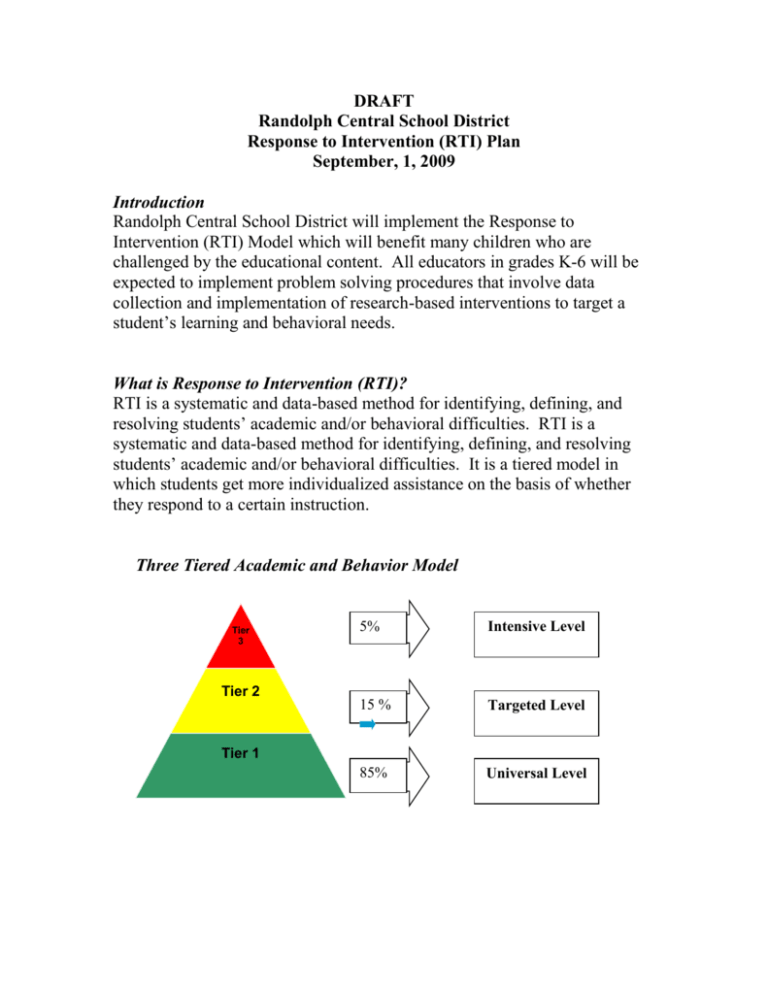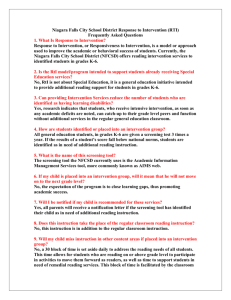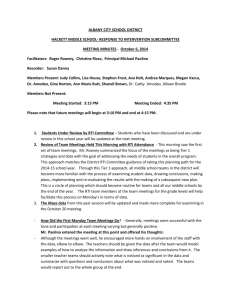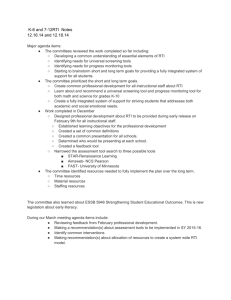Response to Intervention (RTI) Plan
advertisement

DRAFT Randolph Central School District Response to Intervention (RTI) Plan September, 1, 2009 Introduction Randolph Central School District will implement the Response to Intervention (RTI) Model which will benefit many children who are challenged by the educational content. All educators in grades K-6 will be expected to implement problem solving procedures that involve data collection and implementation of research-based interventions to target a student’s learning and behavioral needs. What is Response to Intervention (RTI)? RTI is a systematic and data-based method for identifying, defining, and resolving students’ academic and/or behavioral difficulties. RTI is a systematic and data-based method for identifying, defining, and resolving students’ academic and/or behavioral difficulties. It is a tiered model in which students get more individualized assistance on the basis of whether they respond to a certain instruction. Three Tiered Academic and Behavior Model Tier 3 5% Intensive Level 15 % Targeted Level 85% Universal Level Tier 2 Tier 1 Tier 1 UNIVERSAL, CORE INSTRUCTION All students in the general education classroom are provided with scientifically-based, high quality instruction, differentiated to meet their needs. Students are screened regularly to identify struggling learners. Tier 2 TAREGETED, SUPPLEMENTAL INSTRUCTION Students who are not making adequate progress in the core curriculum are provided with supplemental instruction matched to their needs on the basis of levels of performance. Tier 3 INTENSIVE, INDIVIDUALIZED INSTRUCTION Students receive individualized, intensive interventions that target the students’ skill deficits. A possible comprehensive evaluation can take place at this level. RTI/ Child Study Team The referring teacher will contact the child’s parents and complete a parent interview (Appendix I) before an initial CST meeting. The Randolph Elementary Child Study Team will review the CST referral form (Appendix II) which consists of student data provided from the referring teacher. The role of the CST Team during CST meetings will be to analyze student data, collaborate on research-based strategies and interventions to target the student’s academic and/or behavior concerns and to mentor/coach teachers with effective practices in the classroom. The Child Study/RTI problem solving team meetings will be co-chaired by the school psychologist and school counselor. The CST/RTI Team also consists of a Spec. Education teacher, AIS/Title I Reading teachers (3), Curriculum Coordinator, Director of Pupil Personnel, School Counselor, Speech Pathologist, School Psychologist and elementary teachers (2). Data Collection Universal Screening Each student in Grades Prek-6 will be screened to identify areas of concern. The following screenings are administered in the beginning of the school year: ELA Dial 3 (Prek) DIBELS (K-4) RIGBY Running Records (K-5) Houghton Mifflin Running Records (K-5) Math TEMA-3 (K-1) Mclass Math-(K-3) Key Math (2-6) Benchmarking and Progress Monitoring In order to track a student’s progress in a specific skill area, benchmark assessments and progress monitoring tools will be used: DIBELS (Progress Monitoring) Twice a month for level Red Once a month for level yellow Three times a year for level green RIGBY Running Records (at least 3 times per year) Houghton Mifflin Running Records (optional) Houghton Mifflin Integrated Theme tests (per thematic unit) Read 180 (Grades 5-6 special education and AIS students) Waterford Lab (Prek-3) Woodcock-Johnson Comprehension and Fluency (Grades 5-6) Assessments DIBELS (K-4) Terra Nova (K-2) NYS ELA and Math Assessments (Grades 3-6) Math Mclass (K-3) Curriculum-Based Measurements (CBM) Implementation Timeline From September 2004-June 2009, Reading First was implemented in Grades K-3 along with components taking place in Grades 4 for transitional purposes. Starting September 2009, a Reading First Model will continue to be followed in Grades K-4 with the implementation of the same components as during the grant period. Grades 5 and 6 will begin the RTI process in September 2009, using the same model and some components as Grades K-4. September 2004- June 2009 DIBELS benchmark assessments and progress monitoring Mclass data collection system to track and evaluate progress Adoption of Houghton-Mifflin Reading Series, K-4 RIGBY Running Records, K-4 90 Minute Reading block incorporating the 5 components of reading Child Study Team monthly meetings Waterford, K-3 September 2008-present Positive Behavior and Supports (PBIS), K-6 Capturing Kids’ Hearts, 5-6 September 2009 In addition to all components above: Houghton-Mifflin Reading, K-5 RIGBY Running Records, K-5 Read 180, Grades 5-6 Waterford, Prek-4 Step-Up to Writing Refresher trainings and implementation Curriculum –Based Measurements for math, reading, writing Mclass Math, K-3 Child Study/RTI Problem Solving Team, mentor/coaching model, application of research-based interventions Response to Intervention library and resource center RTI Professional development opportunities Evaluation Data collection of % increase or decrease in skill areas over a period of time Data collection of effectiveness of prescribed interventions Annual faculty/staff survey TIERED INSTRUCTION Tier 1 Core Instructional Curriculum READING 90 minutes daily -NYS ELA Core Guides, -Houghton Mifflin Reading Series (K-5) -DIBELS -Steck-Vaughn Elements of Reading (vocab.) (K-4) Tier 2 Supplemental small group instruction MATH WRITING 60 minutes daily -Step up to Writing -Houghton Mifflin Math -CBM (targeted skill areas) -Thoughtful Classroom -hands-on manipulative kits 30 Minutes AIS/Title I -MClass Math -Study Island -Positive Behavior and Supports (PBIS) -PBIS reward coupons -parent teacher conferences -Office discipline referral (minor offense) -Mclass Math (K-3) -Study Island -Soar to Success (Title I) -Writing CBMs) -consultant services to all students - Waterford 30 minutes AIS or Title I -Writer’s Workshop BEHAVIOR 30 minutes AIS Title I -Supplemental writing materials targeting skill -Behavior Plans and report cards -counseling -Office -Read 180 (Gr.5/6 AIS, Spec. Ed) -NYS Supplemental skills based materials (AIS) Tier 3 Intensive Individualized Instruction -CBM Math area -NYS supplemental skills based materials - 30-40 minutes -Glass Analysis Touch Math - Starting Over -CBMs with increased frequency -CBMs with increased frequency and possible individualized service from a specialist discipline referral (minor w/ staff handled) -Functional Behavioral Assessment (FBA) -1 on 1 counseling -Possible Outside Counseling -Office Discipline referral (major w/ administrator action) Special Education Eligibility The special education referral process will consist of the RTI problemsolving model. Students will be classified learning disabled based on documentation of how well they respond to scientific, research-based interventions as part of the evaluation procedure. The discrepancy modelIQ and academic testing will not be the sole distinguisher of a learning disability as of September 2009.


